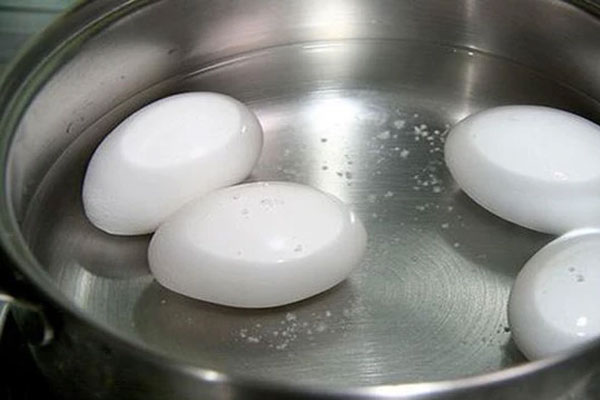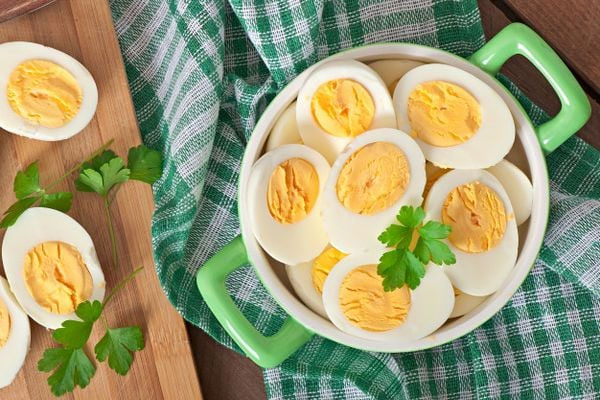Boiling eggs may seem like a simple task, but many people encounter issues with cracked shells. Water seeping into these cracks can mix with the egg white and yolk, making the boiled egg less appealing and even affecting its taste. Here are some tips to help you boil eggs perfectly, ensuring they look and taste great while retaining their nutritional value.
Don’t boil too many eggs at once
When boiling eggs, place them in a pot of gently boiling water. To prevent cracking, avoid overcrowding the pot, as this can cause the eggs to bump into each other and crack.
 Add a teaspoon of vinegar to each egg before boiling.
Add a teaspoon of vinegar to each egg before boiling.
Add vinegar and a pinch of salt to the water
Before boiling, add a teaspoon of vinegar to each egg. Vinegar helps the egg white coagulate faster and makes the shell harder, reducing the chances of cracking. Adding salt to the water will make peeling the eggs easier and may also help prevent cracking.
Bring the water to a boil before adding the eggs
To avoid cracked eggs with the whites leaking out, bring the water to a gentle boil first, and then add the eggs. This ensures that the eggs are exposed to consistent high heat, reducing the likelihood of cracking and the whites escaping.
Boil the eggs over medium heat
When boiling eggs, use medium heat to maintain a gentle boil. This prevents the eggs from knocking around violently in the pot, which can cause cracking. Keeping the heat moderate helps maintain the eggs’ attractive appearance without the whites spilling out.
Use a pot that’s the right size
Choose a pot that’s appropriately sized for the number of eggs you’re boiling. A pot that’s too large or too small can cause the eggs to knock against each other or the sides of the pot, leading to cracking. Using the right-sized pot ensures even cooking.
 Boiled eggs that look great and retain their nutritional value.
Boiled eggs that look great and retain their nutritional value.
Plunge the eggs into cold water immediately after boiling
As soon as the eggs are cooked, remove them from the pot and place them in a bowl of cold water. This stops the cooking process and makes the eggs easier to peel, while also reducing further cracking due to sudden temperature changes. This helps maintain the eggs’ freshness and attractive appearance.
Notes:
Don’t overboil the eggs
Some people believe that boiling eggs for longer ensures that all bacteria on the shell are killed. However, this can lead to a reduction in the eggs’ nutritional value as the iron and sulfur compounds in the eggs combine. Overboiling can also increase the chances of cracked shells, affecting the quality and appeal of the eggs.
Don’t underboil the eggs
While some people prefer runny yolks, it’s important to fully cook eggs to prevent bacterial contamination, which can cause diarrhea, digestive issues, and food poisoning. Proper cooking ensures the eggs are safe and healthy to consume.
Additionally, if you’re storing eggs in the refrigerator, take them out about 15 minutes before boiling, and only add enough water to cover the eggs by 2-3 cm. Always leave the lid off when boiling.
Source: GĐ&xh





































